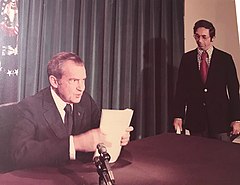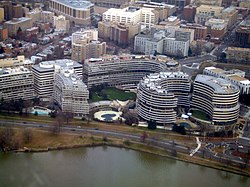
Back Discurso de renuncia de Richard Nixon Spanish נאום ההתפטרות של ריצ'רד ניקסון HE 理查德·尼克松辞职演讲 Chinese
 Nixon preparing to deliver the speech | |
| Date | August 8, 1974 |
|---|---|
| Time | 9:01 pm (Eastern Time, UTC-04:00) |
| Duration | 16 minutes |
| Venue | Oval Office, White House, Washington, D.C., U.S. |
| Location | Washington, D.C., U.S. |
| Cause | Watergate scandal |
| Participants | Richard Nixon |
| Watergate scandal |
|---|
 |
| Events |
| People |
On August 8, 1974, U.S. President Richard Nixon delivered a nationally-televised speech to the American public from the Oval Office announcing his intention to resign the presidency the following day due to the Watergate scandal.
Nixon's resignation was the culmination of what he referred to in his speech as the "long and difficult period of Watergate", a 1970s federal political scandal stemming from the break-in of the Democratic National Committee (DNC) headquarters at the Watergate Office Building by five men during the 1972 presidential election and the Nixon administration's subsequent attempts to cover up its involvement in the crime. Nixon ultimately lost much of his popular and political support as a result of Watergate. At the time of his resignation the next day, Nixon faced almost certain impeachment and removal from office.[1]
According to his address, Nixon said he was resigning because "I have concluded that because of the Watergate matter I might not have the support of the Congress that I would consider necessary to back the very difficult decisions and carry out the duties of this office in the way the interests of the nation would require." Nixon also stated his hope that, by resigning, "I will have hastened the start of that process of healing which is so desperately needed in America." Nixon acknowledged that some of his judgments "were wrong," and he expressed contrition, saying: "I deeply regret any injuries that may have been done in the course of the events that led to this decision." He made no explicit mention, however, of the articles of impeachment pending against him.[2]
The following morning, August 9, Nixon submitted a signed letter of resignation to Secretary of State Henry Kissinger, becoming the only U.S. president to resign from office. Vice President Gerald Ford succeeded to the presidency upon Nixon's resignation.[3]
- ^ Wertheimer, Linda (August 8, 2014). "Remembering The Emotional Fallout From Nixon's Resignation". Morning Edition. NPR. Retrieved January 2, 2020.
- ^ "Nixon Resigns". The Washington Post. The Watergate Story. Archived from the original on November 25, 2016. Retrieved January 2, 2020.
- ^ "News Summary and Index Saturday, August 10, 1974: The presidency". The New York Times. August 10, 1974. Retrieved January 2, 2020.